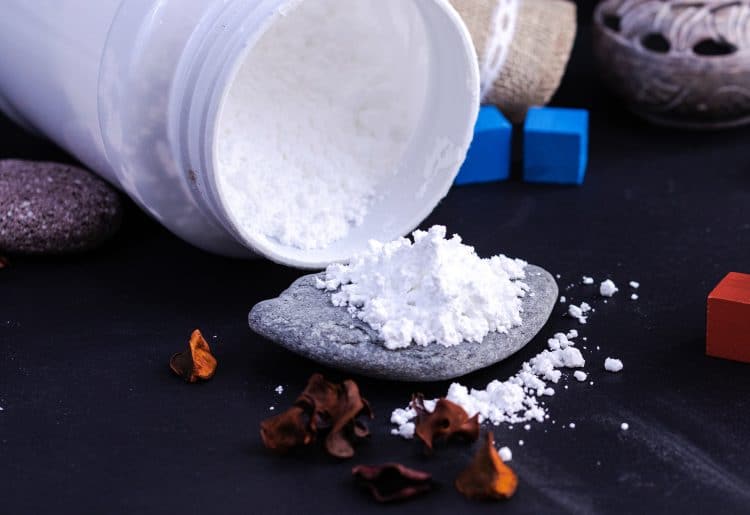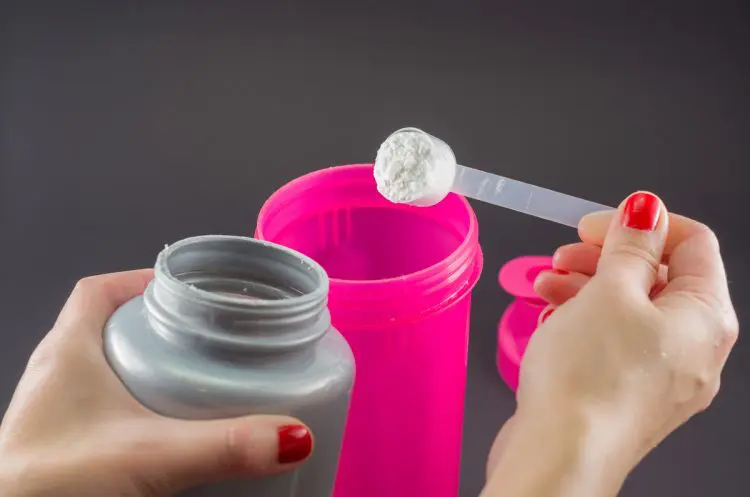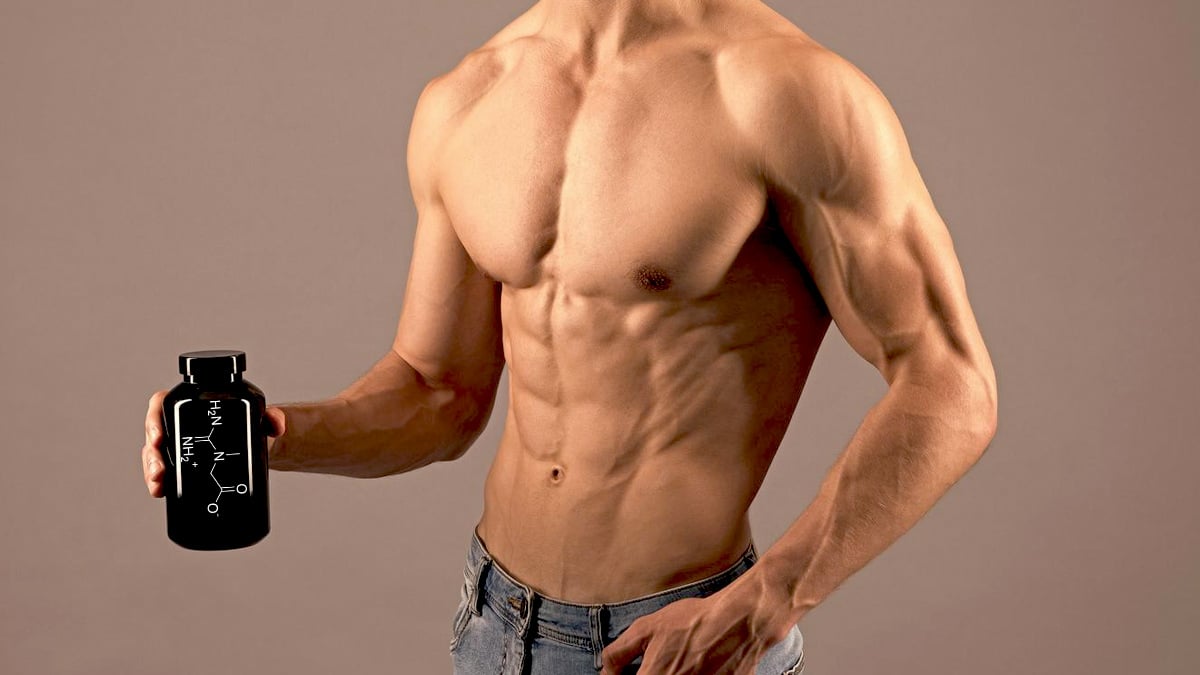Like most other supplements, creatine takes its time to show results. The results of supplementing with creatine will depend on your eating habits, metabolism, body weight, supplementation schedule, and training intensity. So, you will have to consider these factors to know how long before you start to see creatine-induced results.
For creatine to work, you must take enough of it to reach the saturation point (roughly around 140 gms). Creatine saturation can help build muscle, improve strength, and enhance overall function.
The amount of time it will take for you to hit the saturation point will depend on your daily creatine consumption. While the loading phase (20 grams a day) can help achieve saturation faster, it might not suit everyone as it can cause gastric issues. If that is the case with you, you should instead opt for the maintenance phase (2-5 grams per day) and be patient with the effects.
Let us talk about what to expect when you start your creatine journey.
Early Stages of Creatine Supplementation

Your initial results will depend on how quickly you can achieve creatine saturation. Remember, if you’re a beginner, creatine won’t probably work for you within the first few days of supplementing with it. You will have to build enough creatine reserves in your body before you can notice its results.
Even when following the loading phase protocol of consuming around 20 grams of creatine a day, it takes about 5-7 days on average to reach saturation.
However, if you consume creatine HCL instead of creatine monohydrate, you might not require the loading phase, as the needed daily dose of creatine HCL is just 2-3 gms, and it gets you to the saturation point in under a week. However, this form of creatine is costlier. For people experiencing side effects such as bloating and stomach issues, creatine HCL works better than monohydrate.
Must Read: Creatine Monohydrate Vs. HCL: What’s the Difference?
What to Expect at Later Stages of Creatine Ingestion?
Several studies have been conducted to see the effects of creatine during the maintenance and loading phase. Let us understand the expected time to get creatine working for your body.
1 Week Post-Creatine Supplementation
Results within one week of creatine supplementation are primarily associated with the loading phase. A small amount of creatine, like in the maintenance phase, is unlikely to be effective within just seven days.
A study indicated that taking 20 gm of creatine per day for five days improved performance in 80 minutes of repeated bike sprint exercise in males. [1]
One week of creatine loading is enough to cause muscle fullness. This happens because creatine holds fluid inside the muscles, increasing muscle size. Some athletes also believe it causes short-term weight gain, but there is no concrete scientific evidence to prove this effect. [8]
1 Month Post-Creatine Supplementation
The body weight will likely balance out with one week of loading, followed by the maintenance phase. However, if you start slow and steady with the maintenance phase right from the beginning, you might have to wait a month to see the touted effects like muscle fullness and improved exercise performance. These results are comparable to one week of the creatine loading phase.
A 4-week study conducted on athletes who took creatine supplements with a complex training program concluded that the combination improved muscular strength and reduced muscle damage during training. [2]
It is important to note that creatine showed effects in conjunction with rigorous training performed by the subjects. Also, genetics, metabolism, and dietary factors affect how long it takes for creatine results to kick in.
3 Month Post-Creatine Supplementation
Many studies back the multiple benefits associated with long-term creatine use, irrespective of whether you start with the loading phase or not. You can expect to do more reps, lift heavier weights, and perform better in high-intensity workouts while reducing the chances of injury during training.
Numerous studies back these findings and indicate that creatine supplementation leads to around eight percent better muscle strength and lifting performance. However, the degree of the response varies across different subjects. Creatine can be used for the long term, around 30gm per day for five years or 3g per day throughout the lifespan to sustain these effects. [3] [4]
Some myths about creatine make people believe that creatine leads to dehydration or muscle cramping, but studies do not hold them true. [5]
You should drink 4-5 liters of water daily while supplementing with creatine to avoid possible side effects. Also, once you stop creatine intake, you might experience fatigue, strength loss, and loss of water weight as the body adjusts to your new routine.
Does Your Creatine Schedule Affect Your Results?
How quickly you saturate your muscles with creatine will determine how long it takes for your body to start benefiting from this supplement. The time it takes to achieve muscle saturation would depend on your initial creatine stores. Following a loading schedule might help saturate your muscles sooner, but your body might not support it.
Following a maintenance phase after the initial loading helps maintain creatine levels and promote creatine synthesis in your body.
How to Decide the Ideal Amount of Creatine for your Body Type?
Anywhere between 3-5 gms per day is a good amount of creatine to start with. However, most athletes go for around 5gms, which is also the recommended dose for most creatine products available on the market.
Another way of calculating the ideal creatine dose is by using your body weight. Roughly around 0.1 gm of creatine per kg of body weight is fine when combined with resistance training. [6]
You can also use our convenient online creatine calculator for this purpose.

How to Make Creatine Work Faster?
If you want to see results faster, start with the loading phase and switch to the maintenance phase after a week or so.
While the most common loading phase dosage is 20 gm—split into four servings a day—a study showed benefits with the 20 gms divided into 20 servings of 1 gm each during the day. Even though you might have to take creatine at each hour of the day, studies show this regime puts less pressure on the bowel and makes you excrete less creatine. [7]
You should follow a proper exercise regime and the right creatine scheduling for quicker results.
Creatine and Type of Workout
Although creatine is good for high-intensity anaerobic exercises such as sprints or strength training, it is not that effective for steady-state activities. The reason could be that the latter do not efficiently tap into the stored creatine surplus as much as the high-intensity exercises. [8]

Does the Creatine Type Matter?
Monohydrate is the most popular (and budget-friendly) type of creatine available on the market. You should check out the ingredient label and choose a brand that delivers pure and high-quality creatine.
Buffered creatine, gluconate, anhydrous creatine, etc., are just fancy names to put you in a choice paradox and allow the brands to charge a premium.
Another reason for choosing creatine monohydrate is that most studies on creatine supplementation use monohydrate. So you should not spend more on something that does not have research to back its claims.
FAQs
1. How to use creatine most effectively to see lasting results?
Experts recommend starting the loading phase with around 20 gm creatine per day for a week, followed by the maintenance phase with around 3-5 gm per day.
2. When is the best time to take creatine?
There isn’t much concrete research on whether taking creatine pre or post-workout works better. However, research has shown that taking creatine post-workout helps transport it through the muscles well due to better blood flow. [9]
3. What results can you expect from the first month of using creatine monohydrate?
You can expect to see fuller muscles and better performance in high-intensity exercises.
4. Will creatine make a woman gain weight?
You might gain some weight during the loading phase, but your weight will likely sustain itself once your body gets used to creatine. The weight gain is mainly due to water retention and increased muscle mass. However, creatine won’t increase your fat levels as it is calorie-free.
5. What happens when you stop creatine?
You might experience fatigue and low strength levels after stopping creatine. You will also lose water weight. When you take creatine supplements, your body stores most of it in the muscles and liver, but when you stop taking the supplements, these levels drop. This can cause side effects like weakness, fatigue, weight loss, and reduction in natural creatine production.
Learn more about Creatine:
- The 5 Supplements Worth Taking (And Another Five That Aren't)
- Creatine Before and After: How Creatine Supplement Affects Your Body
- I’m a Supplement Researcher — These 3 Creatine Forms Will Supercharge Your Gains (and One’s a Total Rip-Off)
- Creatine and Acne: Are You Making This Common Mistake?
- STOP Wasting Your Creatine! The Ultimate Guide to Proper Usage
- How Long Does Creatine Stay in Your System? A Doctor Explains
- What Happens To Your Body When You Take Creatine Every Day For Muscle Gain?
- Creatine + Whey Synergy: The Science Behind This Power Duo's Muscle-Building Magic
The Bottom Line
To get the best results with creatine supplementation, experts recommend combining it with an effective diet and workout routine. Being a non-vegetarian does not mean you should not think about creatine supplementation at all, as with around 1-2 gm of dietary creatine a day, your muscles are only 60-80% saturated. [10]
While creatine might cause water retention, stomach upset, or slight weight gain in the initial phase as your body starts adjusting to it, the long-term side effects aren’t that pronounced.
Intermediate and advanced athletes should start noticing the effects of creatine within a month of starting supplementing with it. On the other hand, newbies should give the supplement at least a couple of months to work its magic.
References
Fitness Volt is committed to providing our readers with science-based information. We use only credible and peer-reviewed sources to support the information we share in our articles.
- “Effect of Creatine Loading on Long-Term Sprint Exercise Performance and Metabolism – PubMed.” PubMed, pubmed.ncbi.nlm.nih.gov, 1 May 2001.
- “Effects of 4-Week Creatine Supplementation Combined with Complex Training on Muscle Damage and Sport Performance – PubMed.” PubMed, pubmed.ncbi.nlm.nih.gov, 2 Nov. 2018.
- “Effects of Creatine Supplementation and Resistance Training on Muscle Strength and Weightlifting Performance – PubMed.” PubMed, pubmed.ncbi.nlm.nih.gov, 1 Nov. 2003.
- Kreider, Richard B., et al. “International Society of Sports Nutrition Position Stand: Safety and Efficacy of Creatine Supplementation in Exercise, Sport, and Medicine – PMC.” PubMed Central (PMC), www.ncbi.nlm.nih.gov, 13 June 2017.
- Antonio, Jose, et al. “Common Questions and Misconceptions about Creatine Supplementation: What Does the Scientific Evidence Really Show? – PMC.” PubMed Central (PMC), www.ncbi.nlm.nih.gov, 8 Feb. 2021.
- Cooper, Robert, et al. “Creatine Supplementation with Specific View to Exercise/Sports Performance: An Update – PMC.” PubMed Central (PMC), www.ncbi.nlm.nih.gov, 20 July 2012.
- “Urinary Creatine and Methylamine Excretion Following 4 x 5 g x Day(-1) or 20 x 1 g x Day(-1) of Creatine Monohydrate for 5 Days – PubMed.” PubMed, pubmed.ncbi.nlm.nih.gov, 1 May 2009.
- Cooper, Robert, et al. “Creatine Supplementation with Specific View to Exercise/Sports Performance: An Update – PMC.” PubMed Central (PMC), www.ncbi.nlm.nih.gov, 20 July 2012.
- Ribeiro, Felipe, et al. “Nutrients | Free Full-Text | Timing of Creatine Supplementation around Exercise: A Real Concern? | HTML.” MDPI, www.mdpi.com, 19 Aug. 2021.
- Kreider, Richard B., et al. “International Society of Sports Nutrition Position Stand: Safety and Efficacy of Creatine Supplementation in Exercise, Sport, and Medicine – Journal of the International Society of Sports Nutrition.” BioMed Central, jissn.biomedcentral.com, 13 June 2017.










